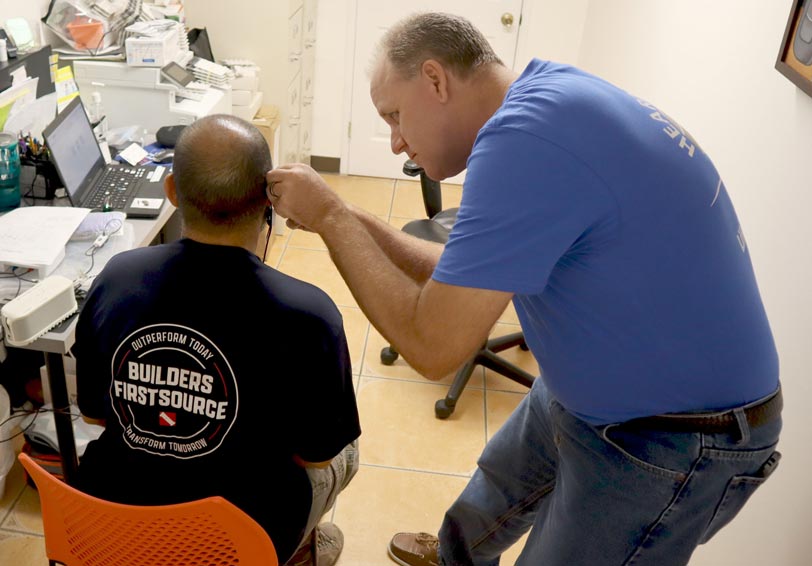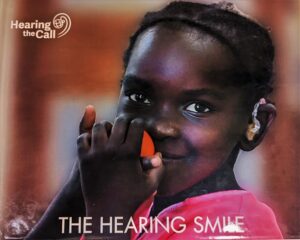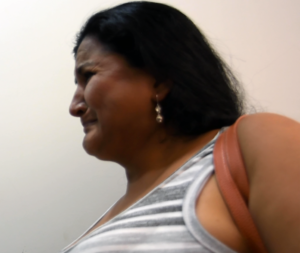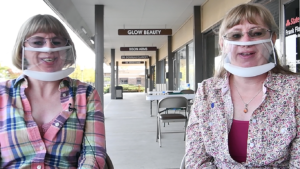Background Noise – Dr. Turri – Daily Sun Column
Dr. Al Turri, AuD, Director of Audiology at The Villages Health, discusses how background noise can affect your hearing and health.
Background Noise – Dr. Turri 03.23.22
Dr. Al Turri, AuD, Director of Audiology at The Villages Health, discusses how background noise can affect your hearing and health.
The Villages Health Audiology Department is your hometown resource for help with dizziness, balance & vertigo. We have partnered with the American Institute of Balance (AIB) to provide you with the most effective solutions to this area of specialized care.
We can perform the following tests to determine if you are affected by balance disorders:
To schedule, give us a call: 352-320-4797
UNDERSTANDING
Fall Risk and Prevention
DID YOU KNOW…
Many people believe that loss of balance and falls are a natural result of aging. In fact, fear of falling is the number one health concern of individuals in their later years. Below are some common myths associated with falls:
MYTH #1: Falling is something normal that happens as you get older
FACT: Falling is not a normal part of the aging process. However, as we age, certain risk factors can contribute to loss of balance and falls. Effective clinical and community interventions exist for these risk factors. Talk openly with your health care provider about fall risks and prevention today!
MYTH #2: Taking medication doesn’t increase my risk of falling
FACT: Statistics show that individuals taking multiple medications have an increased risk of falling. Talk to your medical doctor about reviewing and managing your medications.
MYTH #3: If I limit my activity, I can avoid falling
FACT: Limiting physical activity results in muscle weakness which can increase your chance of falling. Muscle weakness and balance can improve across the lifespan for most individuals. Ask your health care provider how an individualized exercise program can help!
MYTH #4: As long as I stay at home, I can avoid falling
FACT: Isolation and limited mobility are linked to symptoms of depression, which have shown to increase your risk of falling. Talk to your health care provider if you have symptoms of depression such as feeling down or alone.
MYTH #5: Using a walker or cane will make me more dependent
FACT: The use of the appropriate assistive device can improve your independence and quality of life by promoting safer walking within the home and community. This results in improved strength, balance, and endurance, all of which reduce one’s fall risk significantly.
MYTH #6: I don’t need to get my vision checked every year
FACT: Your vision plays a large role in maintaining your balance! It’s very important to have your vision checked annually to ensure you have the appropriate eyewear prescript ion, if necessary.
MYTH #7: I don’t need to talk to my family or health care provider if I’m concerned with falling. I don’t want to alarm them, and I want to keep my independence
FACT: Having an open conversation with both your family and health care provider can increase safety, decrease risk of injury, and prolong your independence! A team approach can minimize fall risk and increase peace of mind for all involved!
To identify your personal fall risk profile, please take the Patient Self Quiz.
AIB Patient Self Quiz
y N
□ □ 1. Do you or your loved one suffer from any of the following conditions?
□ □ 2. History of fall in the past year?
□ □ 3. Vertigo and/or dizziness?
□ □ 4. Poor balance?
□ □ 5. Fear/anxiety of falling?
□ □ 5. Difficulty walking?
□ □ 6. Use of assistive device such as a cane to walk?
□ □ 7. Peripheral neuropathy?
□ □ 8. Vitamin D insufficiency?
□ □ 9. Multiple medication prescriptions?
□ □ 10. Blood Pressure and/or Cardiovascular problems?
□ □ 11. Vision impairment?
□ □ 12. Muscle weakness?
□ □ 13. Orthopedic concerns, including arthritis or total joint replacement?
□ □ 14. History of Stroke or Neurological disease (example: Parkinson’s, Multiple Sclerosis)?
If you answered yes to any of the conditions above, now is the time to talk to your health care provider about preventative measures to minimize your risk of falls and injury. Your medical doctor can work closely together with a physical therapist to establish a fall prevention plan specific to your individual needs. Through proper diagnostic and therapeutic interventions, many of which are non-surgical and non-pharmaceutical, older adults can reduce their risk of falls and enjoy safer, more independent lives.
UNDERSTANDING
Vertigo, Imbalance, and Motion Sickness
DID YOU KNOW?
EQUILIBRIUM DISORDERS FALL INTO TWO MAIN CATEGORIES
The first is dizziness, vertigo, or motion intolerance. This condition may be caused or worsened by rapid head movement, turning too quickly, walking, or riding in a car. These symptoms can be acute or sharp attacks lasting for seconds or sometimes for several hours.
The second is a persistent sense of imbalance or unsteadiness. Some people refer to this as a loss of surefootedness.
There can be many causes of dizziness and imbalance, with the largest percentage coming from the vestibular system. The vestibular system is an organ located in the inner ear which relays information to the brain about balance and orientation of the body and head.
Balance is a complex interaction which requires input from our vestibular system, in addition to our vision and the sensation from our feet, muscles, and joints. If any one of these systems are not working properly, the patient will suffer loss of balance.
Although very common, problems with equilibrium may indicate serious health risks, or limit a person’s everyday living. The great news is that diagnostic and treatment options have become more effective and can now identify 90% of all causes of dizziness. There is now hope for many who once thought there might not be relief. With proper diagnosis, treatment techniques, and therapeutic exercises, many older adults can return to more active lives.
SELF QUIZ
1. A feeling of motion, spinning or falling when moving your head quickly or changing your position? (Ex. Getting in and out of bed).
2. Uncomfortable trying to get around in the dark?
3. Walking down the grocery store aisles or through the mall is upsetting?
4. Your feet just won’t go where you want them to?
5. A sense of unsteadiness? A feeling you are not surefooted?
6. A fear of falling or stumbling?
7. Looking at moving objects such as escalators or looking out the side window of a car makes you queasy?
8. Difficulty keeping your balance as you walk on different surfaces? (Ex. Tile to carpet)
9. A feeling like you are drifting or being pulled to one side when walking?
10. No one really understands how frustrating this is?
If you answered yes to one or more of these questions, a vestibular and equilibrium evaluation should be considered.
UNDERSTANDING
Vestibular Migraine
DID YOU KNOW…?
1. Migraine affects one out of every 4 females and one of every 6 males. Because it is more often seen in females, increased symptoms and severity may accompany hormonal changes e.g. menses, oral contraceptives, pregnancy, menopause etc.
2. Although quite common, migraine is classified by the American Academy of Neurology as a neurological disorder and is strongly hereditary.
3. 50% of people with migraine never receive a diagnosis, as they believe that this is “just the way we are in our family” or “doesn’t everyone et headaches?”
4. Many people believe that their headaches or other symptoms are due to food allergies from chocolate, red wine, or coffee or they have a “sinus” headache.
5. There is not be a specific “test” which diagnoses migraine, it is usually a diagnosis based on family history and pattern of symptoms.
6. According to the International Headache Society, there are 6 major categories of migraine and many variations within those divisions.
7. Many types of migraine DO NOT cause a headache at all, but instead cause, dizziness, vertigo, nausea, or eye pain and changes in vision.
8. Children, as young as one-year-old, may be have a form of vestibular migraine, called Benign Paroxysmal Vertigo of Childhood (BPV-Childhood), causing them to stagger, have dizziness-vertigo and vomiting.
9. Most people (66%) with a history of migraine, also are prone to motion sickness. Vertigo can be more upsetting and difficult for patients who experience migraine.
WHAT SHOULD I DO IF I THINK I MAY HAVE MIGRAINE?
1. Discuss this with your physician or health care practitioner. He or she may recommend medications or managing symptoms through changes in diet, lifestyle, or activities.
2. In some cases, your health care practitioner may refer you, if you are a female, to your ob-gyn to check status of hormone levels, or to a neurologist for further consultation.
3. Maintain a daily diary to look for specific triggers, e.g. food, activities etc.
4. People with migraine tend to do better if they keep to a regular schedule of sleep, eating meals and stress management. So, if you are traveling or away from home, be mindful that disruption of your regular schedule may be a trigger.
The Good News…
1. If you have experienced dizziness or vertigo because of vestibular migraine, help may be in the form of vestibular rehabilitation, medication, management of lifestyle triggers and monitoring of hormonal status.
2. New advances in understanding the causes and best treatments for the many forms of migraine are being published every year.
3. Understanding your specific triggers, will help you avoid those things, and keep you on track to having more good days.
RESOURCES:
Migraine Research Foundation: migraineresearchfoundation.org
National Headache Foundation: headaches.org
Association of Migraine Disorders: migrainedisorders.org
The program provide opportunities for audiologists, ENT doctors, students, and volunteers to travel to countries and areas such as Jordan, Palestine, Zambia, South Africa, Guatemala, Ecuador, and more. We also provide opportunities to help in our own back yard through local organizations throughout the United States.
Find out more about our local program here: https://hearingthecall.org/thevillages/





**Stories are from Hearing the Call’s book, “The Hearing Smile”

Byron
Ecuador

It was easy to see that Byron was shy and withdrawn when he first arrived at the clinic. He would hide his face when people looked at him. His father had been taking the 15-year-old to a psychiatrist for his “misbehavior” and telling people he was “crazy.” Finally, his family learned Byron suffered from a moderate hearing loss. At a clinic in Manta, Bryon received two hearing aids. Within a few minutes, Byron’s demeanor completely changed, and he was smiling and talkative. His mother began to cry and said she was extremely happy. His parents say Byron’s future is now greatly improved. Byron says he is looking forward to doing better in school and listening to rap music.

“Byron’s future is now greatly improved!” – Byron’s mother, through tears of joy, after her child was fit with two hearing devices

Twins Amanda & Angela have had hearing loss for years. Working in a pre-school, they couldn’t afford new hearing aids. Hearing the Call Colorado was able to help them. The new hearing aids will cut down on background noise and increase their overall hearing. Amanda says that she didn’t even realize how much she wasn’t hearing. Angela says she will be more confident in her classroom because she will be able to hear the kids better and not have to second guess what they are saying.
Hilda
Guatemala

Hilda was a social worker in Guatemala and volunteered to translate for Hearing the Call. She spent three days helping, never sharing her own problem… she also had hearing loss. At the end of the last day, an audiologist noticed Hilda was struggling and tested her. Hilda had moderate hearing loss and was fit with a hearing aid. She broke down in tears telling us she was always scared to find out. She was afraid nothing could be done. She also wanted to make sure everyone else got taken care of first.
What Are the Symptoms and Causes of Hearing Loss?
Hearing is integral to quality of life and can drastically impact your emotional, mental, cognitive and overall health. Hearing loss is a very real concern for most aging adults, and while the degradation of this sense is often considered a common part of aging, hearing loss isn’t something to be dismissed as a fact of life.
According to the Hearing Loss Association of America, it takes the average patient seven years to seek treatment for their hearing loss. This delay in diagnosis and treatment may be due to some ambiguity surrounding hearing loss. Many patients can identify instances in which they suddenly can’t hear in one ear – but what about the moments that aren’t so cut and dry? Hearing loss, especially age-related, has a number of symptoms and accessory causes to be on the lookout for.
The Most Common Types of Symptoms
Symptoms of hearing loss present themselves in a number of ways, but many patients find that hearing loss has a significant impact on their social lives. Those suffering from hearing loss frequently ask others to repeat themselves in conversation, or have trouble understanding exchanges that take place in loud or busy environments, like restaurants. Other social and recreational signs of hearing loss can involve a constant need to turn up the television or radio, or missing important pieces of information in business meetings or other appointments. It can be incredibly frustrating to experience hearing loss in a social setting. If you find yourself having difficulty understanding spoken words, schedule a hearing consultation to get your hearing tested.
Another major symptom of hearing loss is tinnitus, or a ringing in the ears. Tinnitus affects 50 million people in the USA and is most often associated with age-related hearing loss, a progressive degenerative disorder. Tinnitus might sound like a roaring, clicking, hissing, buzzing, or ringing in the ears that is worsened at night, during exposure to loud noises, when you have impacted cerumen (ear wax), or in situations where you are not distracted or engaged with other stimulus. If you think you suffer from tinnitus, an audiologist will be able to diagnose and treat the condition.
Hearing loss has a lot of symptoms, but age isn’t the only culprit. There are several risk factors and causes, making it important for people to routinely get their hearing and ears checked. Hearing loss that is not related to aging can be caused by a number of factors including:
• Damage or trauma to the inner ear – Exposure to loud noises can damage the hairs and nerve cells within the cochlea that send auditory signals to the brain. When damage occurs, the signal is interrupted, and hearing loss occurs.
• Impacted earwax – A cerumen impaction can clog the ear canal and block the conduction of sound into the ear. This is among the most benign causes of hearing loss, and earwax removal will usually restore hearing.
• Ruptured eardrum – Explosive sounds, pressure changes, or the penetration of the eardrum with a foreign object (like a cotton swab) can rupture the eardrum and cause hearing loss.
• Illness – Conditions like meningitis or others that involve high fevers can cause hearing loss.
• Genetics – Heredity may be to blame for some hearing loss and will make you more susceptible to ear damage and age-related hearing loss.
Prolonged exposure to loud noises – Jobs or recreational activities that involve prolonged exposure to loud noises can cause immediate or gradual hearing loss. Activities like shooting firearms, construction work, loud concerts, or motorcycling should be performed with hearing protection to preserve ear and hearing health.
Are you concerned about your hearing health, or interested in how hearing devices can help you hear better and improve your quality of life?
The Villages Health has a team of audiologists ready to answer your questions about hearing loss.
What Is An Audiologist?
An audiologist is a licensed health care professional who specializes in the evaluation, diagnosis, and treatment of hearing loss, tinnitus, and vestibular (balance) related disorders. Audiologists have the ability to treat patients across the entire age spectrum, from infancy to late adulthood. Audiologists are most commonly known for their ability to prescribe and fit hearing devices, thanks to their extensive knowledge on the auditory system and its associated vestibular components. Patients looking into the use of a hearing device, cochlear implant, or hearing-related surgical monitoring will need to work closely with audiologists to ensure proper treatment and maintenance.
The Importance of Education and Licensure
Audiologists are required to obtain licensure and registration in every US state, as well as in the District of Columbia and Puerto Rico. These stringent licensure regulations are complemented by extensive training and schooling – which results in a doctoral degree. In your search for an audiologist, you will most likely encounter a credential called the AuD, or doctor of audiology. This designation is a promise that your audiologist has undergone training from an accredited university graduate program in anatomy and physiology, hearing device and implantable technologies, vestibular function and processes, balance disorders, hearing loss, and the diagnosis of all other hearing related afflictions.
Audiologists are becoming more prevalent in the health care field, as hearing loss has become the number one sensory deficit among older adults Hearing loss, a progressive degenerative disorder is pervasive problem amongst the aging population, one that is now found to be closely associated with early onset dementia. Audiologists can now be found working in hospitals, clinics, private practices, ENT (Ear Nose Throat physicians) offices, schools, and government or military medical facilities. Even though the demand for audiologists is still on the rise, the profession needs some demystifying from a patient perspective. Audiologists are commonly associated with their colleagues, ENTs.
Audiologists and ENTs
While audiologists and ENTs work together through referrals and consultations – there are distinctive differences between the two types of care providers. The simplest way to recall their differences is to keep in mind that audiologists are highly focused on the auditory system and hearing loss, while ENTs specialize in diseases of the ear, nose, and throat. If an audiology patient at The Villages Health is found to be suffering from a condition outside the scope of audiology services, our audiologists will partner with you to get you a referral and seamless care coordination.
An ENT will diagnose your chronic ear infection, but an audiologist will assess your hearing and suggest a treatment plan. If you’re struggling to hear your loved one talk to you , it’s time to see an audiologist. Their expertise doesn’t stop once the hearing devices are prescribed and fitted. Audiologists are qualified to diagnose and treat hearing loss, dizziness, balance problems, tinnitus, central auditory processing disorders and earwax removal. Additionally, they are qualified to screen and refer for other conditions like autoimmune inner ear disease (AIED), cognitive decline, punctured ear drums, sudden deafness, and acute ear infections. A good audiologist will also employ Real Ear Measurements (REM) analysis to assess a hearing device’s efficacy and gain levels for optimal hearing, as well as performing preliminary hearing screenings to determine the severity of your hearing loss.
If you’ve been experiencing symptoms of hearing loss such as a ringing in the ears, difficulty hearing the telephone or television and trouble understanding others – The Villages Health Audiology can help. Many people wait too long to address their hearing problems – but it doesn’t have to be that way. Get the hearing health care you deserve. The Villages Health Audiology will partner with you to deliver first-class compassionate care to suit your personal needs and help you achieve total hearing health.
The Connection Between Cognitive Decline and Hearing Loss
Hearing health is vital to overall wellness, and its importance only increases as we age. You may already be aware that your hearing affects your balance and your ability to communicate with family and friends, but did you know that it also dramatically impacts your brain health? In a 2017 report, hearing loss was reported as the number one modifiable risk factor to reduce the risk of dementia and other forms of cognitive decline.
Hearing loss and a decline in cognitive function have long been considered normal parts of the aging process, and while that is true, recent research indicates that both can be treated and slowed down. Understanding the connection between cognitive decline and hearing loss is the first step in seeking treatment and getting yourself on a path to lead a healthier, more active lifestyle.
How are hearing loss and cognitive decline connected?
Johns Hopkins University researched the effects of hearing loss on older adults in a study that followed a group of older adults over the span of six years. The group underwent a series of cognition tests over the course of the study, revealing that the cognitive abilities of adults with hearing loss declined 30-40% faster than those without hearing loss.
While researchers have been able to identify a link between hearing loss and dementia, there are still several theories as to how and why they are connected. There are three major theories being explored by doctors today. These are:
How to protect your hearing and your brain
The good news is that it’s never too late to take your brain or hearing health into your own hands. The first step is to get a hearing screening to determine whether or not you are suffering from hearing loss. By meeting with a licensed audiologist, you can get a clinically based evaluation and customized treatment plan that addresses your hearing health needs, which may or may not involve the use of hearing devices.
Audiologists don’t just diagnose and treat hearing loss, they are qualified to address other hearing-related problems such as tinnitus, balance disorders, and more.
Visit The Villages Health Audiology to find the right hearing health provider for your unique lifestyle.
What Are the Signs of Hearing Loss in Adults?
As we age, our hair may turn gray, our golf swing may get a little weaker, and our hearing might decline. Age-related hearing loss is a gradual process. It doesn’t happen overnight and if it does, you should seek medical attention immediately! The signs and symptoms of hearing loss may be subtle – even undetectable to the untrained eye (or ear), but the compounding effect will eventually become impossible to ignore. According to the Hearing Loss Association of America, the average patient won’t seek treatment for their hearing loss for seven years – putting them at risk for advanced hearing loss side effects such as depression, anxiety, and cognitive decline. This is why it’s important for adults to be able to recognize the signs and symptoms of hearing loss that will develop as we age.
If any of these symptoms sound familiar, schedule a hearing screening with an audiologist to determine the type and degree of your hearing loss to begin developing the right treatment plan for you.
Treating your Hearing loss can be intimidating, but you’re not alone. Most Americans over the age of 65 experience age-related hearing loss. Those who seek treatment and diagnosis drastically improve their quality of life through the use of hearing devices fitted and prescribed to them by a doctor of audiology.
Call today for a free hearing consultation with a doctor of audiology at The Villages Health.
Sudden Hearing Loss in One Ear: What You Need to Know
Sudden hearing loss or deafness is a medical condition that usually affects one ear. This phenomenon is often an unexplained and rapid incidence of hearing loss that is considered a medical emergency. Sudden hearing loss in one ear can be accompanied by dizziness and tinnitus (ringing or buzzing in the ear) in one or both ears. While it is easy to write this type of hearing loss off as a side effect of allergies, sinus infections, earwax buildups, or other more mundane conditions – prompt diagnosis and treatment is imperative to maintaining total hearing health. Any delay in receiving treatment for this type of sudden hearing loss can decrease the effectiveness of treatment and put patients at risk for prolonged hearing damage.
What are the Causes of Sudden Hearing Loss?
The symptoms of sudden hearing loss extend beyond an acute episode of sudden deafness. The condition may be preceded by ear pressure, tinnitus, loss of sensation in the outer ear and dizziness up to a few days prior to the hearing loss. The cause of sudden hearing loss is yet to be determined by the medical community, but in many cases the circulation of the inner ear is restricted during the condition’s onset. Audiologists and Ear, Nose and Throat (ENT) specialty physicians suggest that sudden hearing loss in one ear can be attributed to:
•Viral or bacterial infections
•Arteriosclerosis or circulatory disorders
•Diabetes
•Cervical spine injury
•Autoimmune diseases
•Middle ear infections
•Thrombosis of the inner ear’s blood vessels
•Blood clots
It’s important to note that sudden hearing loss differs from age-related hearing loss in that it is often the body’s response to other conditions such as high cholesterol, high blood sugar, obesity, and the chronic use of nicotine and alcohol. The association of hearing loss with these risk factors means that it is important to manage your overall health in order to prevent these kinds of conditions from manifesting.
Diagnosing Sudden Hearing Loss
If you are concerned that you’re experiencing warning signs of sudden deafness or if you’ve recently lost hearing, schedule an appointment with an audiologist to diagnose and treat your condition. Sudden sensorineural hearing loss (SSHL) can be diagnosed a hearing test and case history. This test helps determine if hearing loss is caused by sound not reaching the inner ear or if there is a sensorineural deficit. Other diagnostic tests that may be performed in diagnosing sudden hearing loss include blood pressure testing, ear ultrasound or an MRI.
The good news is that more often than not, sudden hearing loss can be treated. The faster treatment is received, the higher the chances that it will be effective. In instances in which the cause of the sudden hearing loss is not known, your doctor might prescribe corticosteroids to reduce inflammation and help the auditory system return to homeostasis.
Recognizing the warning signs and understanding the implications of untreated sudden hearing loss is the first step in the prevention of this condition. If you experience symptoms such as tinnitus, dizzy spells or ear pain, schedule an appointment with an audiologist to address your concerns before your hearing is affected. The Villages Health’s team of audiologists are medically trained to diagnose and treat a variety of disorders related to hearing loss, including sudden deafness.
How Do I Know if I Need a Hearing Device?
The NIH estimates that 48 million people in the United States could benefit from the use of hearing devices. Hearing loss, though a scary thing, is more common than you might think. In fact, nearly 33% of individuals age 65 to 74 experience symptoms and if you are 75+ then its 50%. More often than not, hearing devices are the best treatment option to improve hearing, encourage communication, enhance quality of life and improve cognition including memory.
So, how do you know if you need a hearing device? If you experience one or all of the below hearing related problems, it’s a good time to schedule an appointment with a doctor of audiology.
What is Hearing Loss?
One of the most important parts of determining your treatment plan or eligibility for hearing device technology is to understand what your body is going through. This is why it is important to understand what hearing loss is, and how it is characterized in both an every day and medical setting. Hearing loss is when one’s ability to hear is reduced. It can be caused by injury, congenital defects, or more commonly by the natural aging of the auditory system. Age-related hearing loss, known as presbycusis, is a gradual process that erodes one’s ability to hear. High-pitched or high-frequency sounds are typically affected first, followed by lower frequency sounds as the condition progresses.
You Constantly Need to Increase the Volume
If you find yourself constantly needing to raise the volume on your television, telephone, or radio, you may be experiencing hearing loss. This symptom translates into everyday conversations with your friends and loved ones and can feel isolating. If you catch yourself constantly asking others to speak louder or to repeat themselves in the middle of a conversation, your hearing may be impaired. It can be incredibly frustrating to experience hearing loss that interferes with communication, so take note of these situations when you’re getting ready to speak with a doctor of audiology about your experiences.
You Can “Hear” People, But Not Understand Them
Hearing loss is very rarely cut and dry. You might be able to hear someone speaking to you, but you misunderstand or misinterpret them. This is a common symptom that is often overlooked by patients confused by what’s happening to them. The reason for this phenomenon is because of the pitches and frequencies that you’re able to hear, and those that you are not. When you experience an inability to hear high pitched or high frequency sounds, you’re often missing integral parts of a word or sentence. Thus, you will hear the sounds but not every tone will register. Keep in mind that noisy environments will exacerbate most, if not all of your hearing loss symptoms.
Your Ears Are Ringing
Age-related hearing loss is often accompanied by a condition called tinnitus. Colloquially regarded as a “ringing in the ears” tinnitus is a ringing, buzzing, or whirring sound that can be constant or pulsing. If you experience ringing of the ears – an audiologist may diagnose you with tinnitus. The symptoms of tinnitus might be more intense at night, when additional environmental sounds are dampened. Suffering from tinnitus can be a frustrating ordeal, and one that can be treated by the use of FDA approved technology.
Find a Specialist
Now that you know the signs and symptoms of age-related hearing loss, there’s only one thing left to do to determine if you need treatment. Take inventory of the symptoms you experience and schedule a hearing consultation with a doctor of audiology at The Villages Health. Your audiologist will be able to provide you with a proper diagnosis and help you construct a treatment plan that may or may not involve the use of hearing devices, so you can make the right decision for your needs and unique lifestyle.
Sign up for our newsletter to receive the latest news.